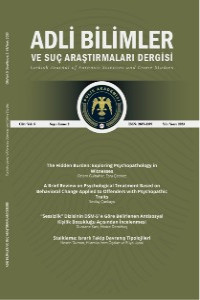Psikopatik Özellikler Gösteren Suçlulara Uygulanan Davranış Değişikliğine Dayalı Psikoterapiler Üzerine Kısa Bir İnceleme
Bu derleme makalesi, rehabilitasyonu zorlaştıran karmaşık bir kişilik örüntüsü olan psikopatinin tedavisine yönelik mevcut terapileri incelemektedir. İnceleme, psikopatiye kısa bir genel bakışla başlamaktadır, psikopa- tinin ayırt edici özelliklerini vurgulayarak, psikopatik özellikler gösteren insanların rehabilitasyonunda yeni terapötik yaklaşımların gerekliliğini vurgular. İnceleme, dört güncel terapi yaklaşımını ele almaktadır: Şema Terapi, Diyalektik Davranış Terapisi (DBT), İşlevsel Davranış Analizi (FBA) ve Onarıcı Adalet. Her stratejinin teorik temelleri, terapötik yöntemleri ve psikopatik eğilimleri azaltmadaki olası etkinliğini dikkatle incelemektedir. Sonuç olarak, bazı teknikler bazı psikopatik özellikleri azaltmada umut verici sonuçlar gösterse de, köklü ve değişime dirençli bir kişilik durumunu tedavi etmenin zorlukları vurgulanmaktadır. Öneri olarak, mevcut tedavi planlarını iyileştirmek ve yeni yaklaşımlar sağlamak için araştırmaların sürdürülmesinin gerekliliği vurgulanmaktadır. Sonuç olarak, bu çalışma, psikopatinin tedavisine ilişkin anlayışımızı derinleştirmek ve başarılı müdahale ve rehabilitasyon olasılığını artırmak için multidisipliner işbirliğini savunmaktadır.
Anahtar Kelimeler:
Şema Terapi, Diyalektik Davranışçı Terapi (DBT), İşlevsel Davranış Analizi (FBA), Onarıcı Adalet, psikopati, tedavi
A Brief Review on Psychological Treatment Based on Behavioral Change Applied to Offenders with Psychopathic Traits
This review article examines current therapies for treating psy- chopathy, a complicated personality disease that makes it difficult to carry out therapeutic activities. The review starts with a brief overview of psy- chopathy, emphasizing its distinguishing characteristics and emphasizing the necessity for cutting-edge therapeutic approaches to address its signi- ficant effects on afflicted people and society. The review carefully menti- ons four well-known psychopathy treatment modalities: Schema Therapy, Dialectical Behavioral Therapy (DBT), Functional Behavioral Analysis (FBA), and Restorative Justice. It does this by drawing on recent resear- ch and clinical data. Each strategy’s theoretical foundations, therapeutic methods, and possible effectiveness in reducing psychopathic tendencies are carefully examined. This study emphasizes the difficulties in treating a personality condition that is deeply rooted and resistant to change, even if certain techniques show encouraging outcomes in reducing some psycho- pathic characteristics. The essay emphasizes the necessity of continuing research to improve current treatment plans and provide fresh approaches. In the end, this study encourages multidisciplinary collaboration to deepen our understanding of this condition and increase the likelihood of success- ful intervention and rehabilitation. It also calls for a complete and integra- ted approach to psychopathy therapy. There is promise for promoting good changes in the lives of persons affected by psychopathy, contributing to a safer and more compassionate society, via ongoing improvements in treat- ment approaches.
Keywords:
chema Therapy, Dialectical Behavioral Therapy (DBT), Fun- ctional Behavioral Analysis (FBA), Restorative Justice, psychopathy, treatment,
___
- Allen, L. C., MacKenzie, D. L., & Hickman, L. J. (2001). The effectiveness of cognitive behavioral treatment for adult offenders: A methodological, quality-based review. International Journal of Offender Therapy and Comparative Criminology, 45, 498- 514.
- American Psychiatric Association. (2013). Diagnostic and statistical manual of mental disorders (5th ed.). Washington, DC: American Psychiatric Association.
- Andrews, D. A., & Bonta, J. (2010). The psychology of criminal conduct (5th ed.) Newark, NJ: Matthew Bender.
- Bernstein, D. P., Arntz, A., & Vos, M. d. (2007). Schema focused therapy in forensic settings: Theoretical model and recommendations for best clinical practice. International Journal of Forensic Mental Health, 6(2), 169–183.
- Bernstein, D. P., Clercx, M., & Keulen‐De Vos, M. (2019). Schema therapy in forensic settings. The Wiley international handbook of correctional psychology, 654-668. Bernstein, D. P., Keulen-de Vos, M., Clercx, M., De Vogel, V., Kersten, G. C., Lancel, M., ... & Arntz, A. (2023). Schema therapy for violent PD offenders: A randomized clinical trial. Psychological Medicine, 53(1), 88-102.
- Bernstein, D. P., & Nentjes, L. (2015). Schema therapy for forensic patients with personality disorders. Utrecht, the Netherlands: Kwaliteit Forensische Zorg.
- Bisback, A. (2022). Restorative justice and psychopathic traits: the perspective of Belgian practitioners. Contemporary Challenges: The Global Crime, Justice and Security Journal, 3, 70-81.
- Bonta, J., & Andrews, D. A. (2007). Risk-need-responsivity model for offender assessment and rehabilitation. Rehabilitation, 6(1).
- Braithwaite, J. (2002). Restorative justice & responsive regulation. Oxford: Oxford University Press.
- Chakhssi, F., Bernstein, D. P., & Ruiter, C. (2014). Early maladaptive schemas in relation to facets of psychopathy and institutional violence in offenders with personality disorders. Legal and Criminological Psychology, 19(2), 356–372.
- ISSN: 2687-3397
- Başlangıç: 2020
- Yayıncı: Polis Akademisi
Sayıdaki Diğer Makaleler
“Sessizlik” Dizisinin DSM-5’ e Göre Belirlenen Antisosyal Kişilik Bozukluğu Açısından İncelenmesi
Durdane KARLI, Hatice DEMİRBAŞ
Gizli Yük: Tanıklarda Görülebilecek Psikopatolojilerin İncelenmesi
Stalklama: Israrlı Takip Davranış Tipolojileri
